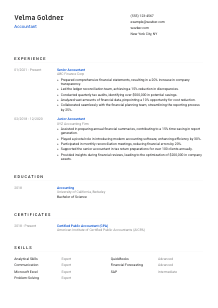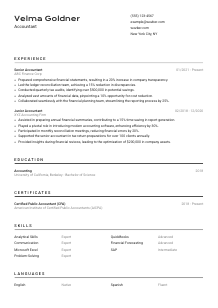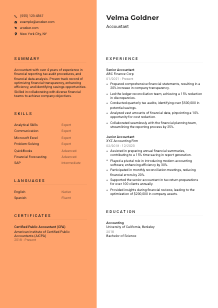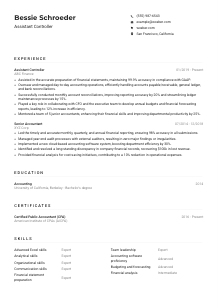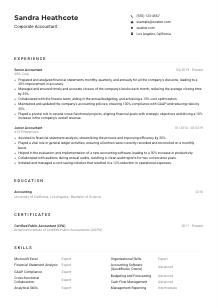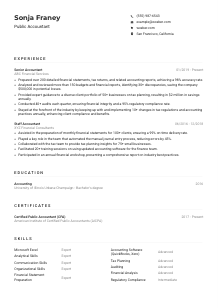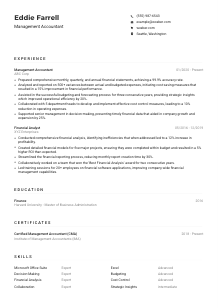Accountant CV Example
Crunching numbers daily, but stumped by your CV? Explore this Accountant CV example, tailored using Wozber free CV builder. Grasp how smoothly you can balance your financial expertise with job specifics, and pave the way for an accounting career that truly adds up!
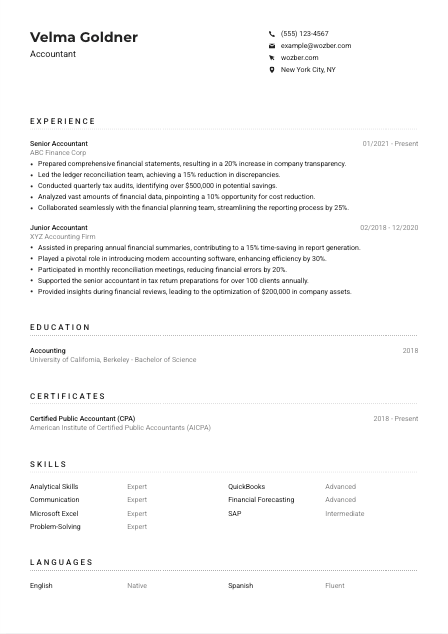
How to write an Accountant CV?
Welcome, driven Accountant-to-be! In the realm where numbers tell stories and accuracy is paramount, your CV is the gateway to countless opportunities. Remember, it's not just about listing your experiences; it's about crafting a narrative that aligns seamlessly with the role you're aspiring for. With the guidance of Wozber's free CV builder, let's traverse the path of creating an ATS-compliant CV that not only meets the eye but also passes the scrutiny of Applicant Tracking Systems (ATS) with flying colors.
Ready to align your skills with the requisites of your dream job? Let's dive in and ensure your CV balances perfectly between personal branding and the demands of an Accountant position.
Personal Details
First impressions count, especially when they come in the form of your CV's Personal Details section. This is your formal introduction; it's concise yet offers a glimpse into who you are. Below, we decode the art of tailoring this section to resonate with your aim of landing an Accountant role, maximizing every line in tune with the job specifics.
1. Brand Yourself with Your Name
Your name is your banner. Make it prompt by adopting a clear, professional font, perhaps with a bit more prominence than the rest of your CV. This isn't just about aesthetics; it's about asserting your presence.
2. Reflect Your Profession
Immediately following your name, position the job title you're pursuing—Accountant. This alignment sets a direct correlation with the job opening from the get-go, making it crystal clear to the hiring manager what role you are vying for.
3. Critical Contact Information
Ensure your contact information is bulletproof. A missed digit or a typo in your email can mean a missed opportunity. Opt for a professional email format and confirm it reflects the level of professionalism an Accountant should embody.
4. Location, Location, Location
Being in New York City, as the job necessitates, is a logistical plus. Specify this in your contact details. It silently checks a box in the hiring manager's criteria, relieving any potential relocation concerns right off the bat.
5. A Portal to More About You
Consider linking a professional profile or portfolio. A LinkedIn profile or a personal webpage can serve as a dynamic extension of your CV, offering insights into your professional ethos.
Takeaway
Think of the Personal Details section as the firm handshake preceding a promising conversation. It's succinct yet packed with the most pertinent details about you, all while staying on course with the Accountant role you're targeting. Striking? Absolutely. Just like the first step in your journey to standing out as the ideal candidate.





Experience
The Experience section is where you get to tell your career story. It's not just about what you've done, but how what you've done aligns beautifully with what you want to do next. By finely tuning each bullet point to the role of an Accountant, you intensify your appeal to potential employers. Let's break down how to make your career narrative as compelling and relevant as possible.
- Prepared comprehensive financial statements, resulting in a 20% increase in company transparency.
- Led the ledger reconciliation team, achieving a 15% reduction in discrepancies.
- Conducted quarterly tax audits, identifying over $500,000 in potential savings.
- Analyzed vast amounts of financial data, pinpointing a 10% opportunity for cost reduction.
- Collaborated seamlessly with the financial planning team, streamlining the reporting process by 25%.
- Assisted in preparing annual financial summaries, contributing to a 15% time‑saving in report generation.
- Played a pivotal role in introducing modern accounting software, enhancing efficiency by 30%.
- Participated in monthly reconciliation meetings, reducing financial errors by 20%.
- Supported the senior accountant in tax return preparations for over 100 clients annually.
- Provided insights during financial reviews, leading to the optimisation of $200,000 in company assets.
1. Decode the Requirements
Begin with a detailed review of the job description. Pay special attention to responsibilities and requirements – 'ledger reconciliation', 'monthly reports', 'tax auditing' – these aren't just tasks; they are your cues on what experiences to highlight.
2. Structure Tells a Story
A chronological approach is your best ally. Start with your most current role and work backward. For each position, clearly state your title, the company's name, and your tenure there. This organisation provides a coherent timeline of your professional growth.
3. Achievement is the Name of the Game
Now, for each role, weave your responsibilities into achievements. Did you enhance financial transparency or cut down on discrepancies? Quantify these accomplishments. For example, leading ledger reconciliation to a 15% reduction in discrepancies is a tale worth telling.
4. The Power of Numbers
Quantification strengthens your claims. Whether it's the size of the budgets you managed or the percentage by which you improved efficiency, numbers draw attention and drive home your impact as an Accountant.
5. Relevance is Key
Yes, that summer you spent as a lifeguard was great, but focus on accounting-centric experiences. Every line should serve the purpose of showcasing your qualifications for the Accountant role. If it doesn't contribute to that goal, rethink its inclusion.
Takeaway
Transform your Experience section into a testament to your qualifications and potential as an Accountant. Think like a hiring manager: if you were hiring an Accountant, what achievements and experiences would stand out to you? By tailoring each bullet point to reflect the job description and your unique impact, you'll not only pass the ATS scan but also captivate the very human eyes eager to find their next accounting maestro.
Education
In the world of accounting, your educational background lays the foundational stones of your career. The Education section, while straightforward, offers a golden opportunity to underscore your qualifications for the Accountant position. Let's uncover how to sculpt this section to highlight its relevance.
1. Match the Degree Requirement
The job post emphasizes a 'Bachelor's degree in Accounting or related field.' Your Bachelor of Science in Accounting is not just a degree; it's a direct match. Make sure this is highlighted, as it speaks directly to the job's foundational requirement.
2. Structured and Succinct
Your degree, your school, and the year of graduation – this trinity should be clearly presented. Clarity is crucial; it ensures that at a glance, the hiring manager can see you have the required educational background.
3. Your Degree, Your Story
If your degree directly relates to the role you're applying for, as is the case here, it deserves the spotlight. Remember to present it in a way that resonates with the role of an Accountant – it's not just education, it's preparation.
4. Coursework Can Play a Supporting Role
Listing relevant courses can be beneficial, especially for those newer to the field or when the courses directly relate to the job requirements. However, when your degree already speaks volumes, like in our example, keep the focus there.
5. Celebrate Academic Achievements
If you've been recognized for your academic excellence or participated in relevant extracurricular activities, mention these. However, gauge their relevance based on your level of experience; as you progress in your career, these details may hold less weight.
Takeaway
Your educational background is more than a requirement; it's a testament to your preparedness for the challenges of the accounting world. Make sure your Education section is clear, concise, and directly correlated with the job at hand. By doing so, you affirm your readiness and dedication to your craft.
Certificates
In the ever-evolving landscape of accounting, continuing education and certifications speak volumes of your commitment to excellence. The Certificates section is your platform to showcase these credentials, crucial for standing out in the Accountant role. Here's how to present your certifications in the most compelling light.
1. Align with Job Requisites
The job description calls for a CPA or equivalent certification. If you have it, like in our example, it's not just a credential; it's a golden ticket. Make sure it's front and center, underlining your direct alignment with one of the job's key requirements.
2. Curate with Care
Instead of listing every certification you've ever earned, focus on those most relevant to the position. This not only highlights your qualification but also demonstrates your discernment and strategic focus.
3. Timing Tells a Story
Include dates for your certifications to indicate currency and relevance. For rapidly evolving fields like accounting, showing that your certifications are recent can give you an edge.
4. Commit to Continuous Learning
The accounting field is dynamic, with regular updates to laws and practices. By staying certified and seeking new learning opportunities, you signal your dedication to staying at the forefront of your profession.
Takeaway
Your certifications are a clear indication of your expertise and your commitment to your career as an Accountant. They're not mere accolades but affirmations of your suitability and dedication to the role. Present them prominently, and let them serve as beacons, guiding the way to your next great opportunity.
Skills
In accounting, your skill set is your currency. The Skills section is your chance to showcase the plethora of capabilities you bring to the table, from your analytical prowess to your software proficiency. Let's navigate how to curate this section to mirror the explicit and implicit skills desired for the Accountant role.
1. Extract Essential Skills
Take a fine-tooth comb through the job description, identifying skills both overtly mentioned and those implied. Skills like "analytical abilities" and "QuickBooks proficiency" shouldn't just be included; they should be emphasized.
2. The Right Mix
Blend hard and soft skills to present a holistic view of your professional toolkit. While the technical know-how like SAP proficiency is crucial, don't underestimate the power of soft skills such as communication, which enables you to convey complex financial data compellingly.
3. Quality Overload
While you might be tempted to list every skill under the sun, restraint is key. Curate your list to include those skills most relevant and desirable for the Accountant role. This targeted approach ensures the hiring manager sees exactly what they need to see – no more, no less.
Takeaway
Think of the Skills section as your professional arsenal, each skill a tool honed through experience and training. By carefully selecting which skills to highlight, you underscore your fit for the Accountant position, compelling the hiring manager to see you as the candidate they've been searching for. Remember, in the world of accounting, the right skills balance is key.
Languages
In a field as diverse as accounting, the ability to navigate multiple languages can give you an edge, especially in firms with international dealings. While English might be a given, showcasing additional linguistic skills can broaden your appeal. Here's how to align the Languages section with the Accountant role and its requirements.
1. Prioritize Job-Specific Languages
Start with the languages explicitly mentioned in the job description. For the Accountant role focused in New York City, proficiency in English is a must. Ensure your proficiency level is accurately represented, setting the stage for effective communication.
2. List Additional Languages
After highlighting the required languages, don't shy away from listing others you're proficient in. This showcases your versatility and potential to contribute in multilingual settings, an increasingly valuable asset in globalized business environments.
3. Honesty in Proficiency
Be crystal clear about your level of proficiency in each language. Whether you're a native speaker or fluent, ensure the hiring manager has an accurate understanding of your capabilities – no embellishments necessary.
4. Consider the Role's Scope
If the Accountant role you're applying for hints at or explicitly involves international dealings, this section becomes even more crucial. It's not just about the numbers; it's about effectively communicating across cultures.
5. A Global Skillset
In today's interconnected world, each language you speak is a bridge to a new market or community. Consider your linguistic skills as part of your global skillset, enhancing your ability to connect, understand, and excel in diverse settings.
Takeaway
Your proficiency in languages, while perhaps a secondary consideration in the world of accounting, can set you apart in a crowded field. It speaks to your ability to engage with diverse teams and clients, a valuable asset in any role. As you present your linguistic capabilities, remember they are not just lines on a CV but representations of the bridges you can build in your professional journey.
Summary
Think of the Summary section as the cherry on top of your carefully crafted CV. It encapsulates your professional identity and directly speaks to how you're the perfect fit for the Accountant role. Let's shape a compelling narrative that ties all your experiences, skills, and qualifications together, priming you as the clear choice for the position.
1. Capture the Essence
Digest the job posting once more, identifying core requirements – from tax auditing to financial data analysis. Begin your summary with a nod to these essentials, positioning yourself squarely in the realm of high-caliber accounting.
2. Initiate with Impact
Start with a powerful introduction that encapsulates your professional persona. Mention your years of experience, key areas of expertise, and how these align with the needs of the position. For an Accountant, mentionables might include financial report preparation and tax audit proficiency.
3. Highlight Your Unique Contributions
Go beyond the basics. Mention specific accomplishments or unique skills – think about those quarterly tax audits where you identified significant savings, or how your ledger reconciliation minimized discrepancies. These aren't just tasks; they're your career milestones.
4. Brevity is the Soul of Wit
This is your elevator pitch – make every word count. Aim for a compact yet potent paragraph that pulls the hiring manager in, making them eager to dive deeper into your CV.
Takeaway
The Summary section is your professional declaration, neatly tying together all aspects of your expertise and unique value proposition as an Accountant. By crafting it with care, you set the tone for the narrative of your CV, compelling the hiring manager to see you as the standout candidate you are.
Launching Your Accountant Journey
Congratulations on fine-tuning your CV with an Accountant's precision! With the insights and steps outlined above, powered by Wozber's free CV builder, including its ATS-friendly CV templates and ATS optimisation tools, you're ready to embark on your path to your next big role. Remember, your CV is more than a document; it's a strategic tool that narrates your professional journey. Now go forth, armed with confidence, and let your journey as an Accountant soar to new heights!

- Bachelor's degree in Accounting or related field.
- Minimum of 3 years of experience in general or tax accounting.
- Proficiency in accounting software such as QuickBooks or SAP.
- Strong analytical, communication, and problem-solving skills.
- Certified Public Accountant (CPA) or equivalent certification.
- English speaking and comprehension skills required.
- Must be located in New York City, NY.
- Prepare financial statements and monthly/quarterly reports.
- Oversee ledger reconciliation and manage accounts payable/receivable.
- Conduct regular tax audits and prepare tax returns.
- Analyze financial data to identify trends, potential risks, and areas for cost reduction.
- Collaborate with other financial departments and provide accounting support.





